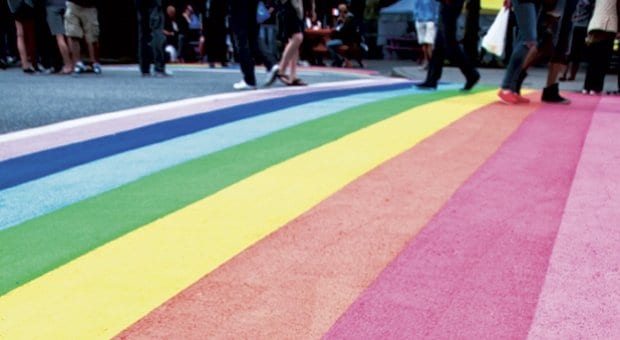
The rainbow crosswalk on Davie Street. Credit: Jon Haywood
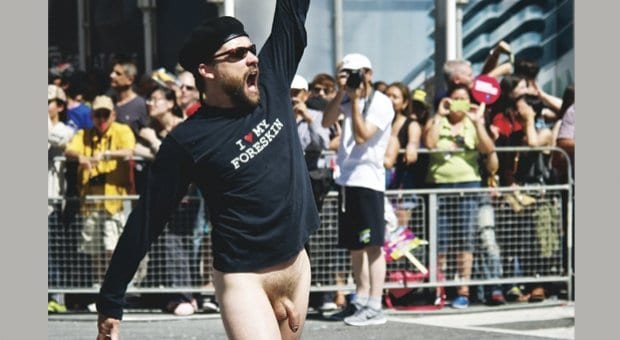
Glen Callender at Toronto Pride. Credit: Allan Selorio
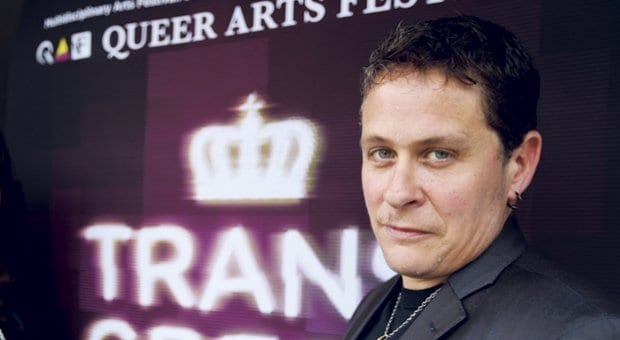
QAF artistic director Shaira (SD) Holman. Credit: David P Ball
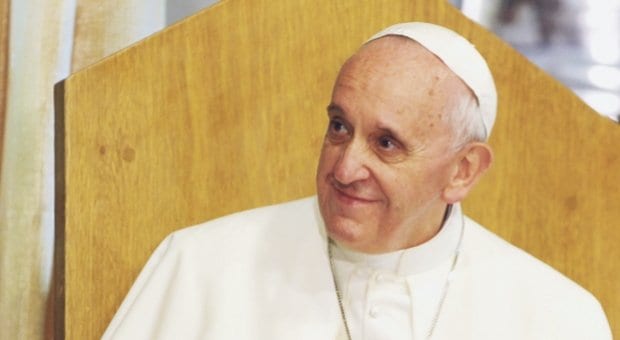
Jorge Mario Bergoglio, aka Pope Francis I. Credit: Wikimedia Commons
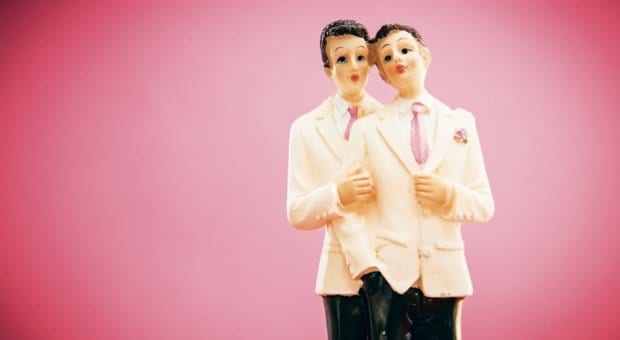
Momentum for gay marriage continued to build. Credit: Thinkstock
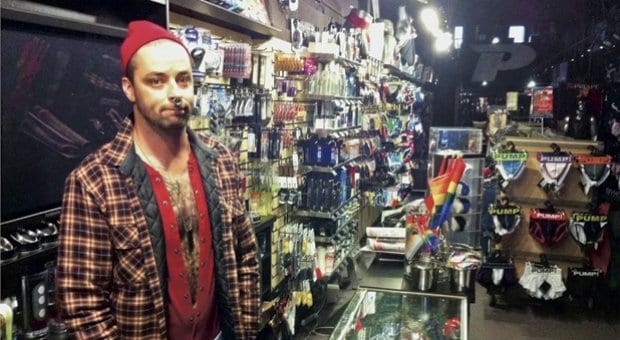
Former Priape manager Del Stamp. Credit: Rob Easton
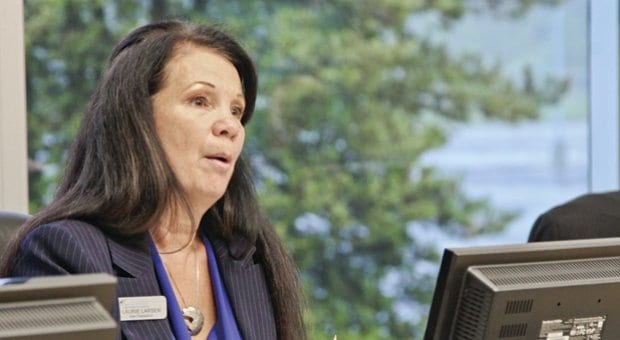
Surrey school board vice-chair Laurie Larsen. Credit: David P Ball
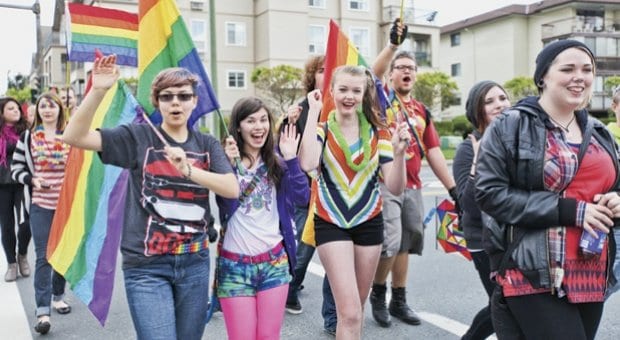
Abbotsford’s first Pride parade. Credit: David P Ball
Newsmaker #1: Vladimir Putin
Before Russian President Vladimir Putin signed off this summer on a nationwide law to gag gay “propaganda,” cities such as St Petersburg tested the waters — and got away with it.
The barely audible international whisper against Russia’s growing anti-gay crackdown became a firestorm in June when Putin, seemingly oblivious to the backlash that would erupt, signed the law with the Sochi Winter Olympics in sight. Prohibiting “propaganda of nontraditional sexual relations,” the law is ostensibly aimed at protecting children from thoughts or images that might awaken any gay interests or give them the impression that such interests are as acceptable as more traditional forms of attraction.
Foreigners flouting the law with a gay-friendly gesture face the prospect of 15 days in prison and deportation.
Mere months before Sochi’s opening ceremonies, Russia’s increasingly anti-gay stance suddenly provoked outrage, calls for boycotts, and kiss-ins around the world. Putin and his entourage wondered what all the fuss was about.
While one Vitaly (sports minister Mutko) told the world to calm down, a second Vitaly (St Petersburg politician Milonov) pooh-poohed reports of violence against gay people as “fake information,” adding that it’s gay people who perpetrate violence against straight people.
For his part, Putin insists that he’s just protecting the children. But his platitudes are inconsistent with the images emerging from Russia: beaten and bloodied gay activists; gay teachers dismissed from their jobs; gun and gas attacks at a Moscow gay club; bomb threats against the Side by Side LGBT film festival; the rise of the violent “Occupy Pedophilia” group that seems to lure, then torment gay people (or worse). The likelihood of more anti-gay laws looms, with one bill proposing to remove children from gay parents in Russia.
The International Olympic Committee seems content to accept “assurances from the highest authorities in Russia” that their Olympics will be welcoming, regardless of sexual orientation. At least the Nobel Committee refused a Putin nomination for this year’s Peace Prize, for his “efforts to maintain peace and tranquility.”
Newsmaker #2: Rainbow city
It’s been a banner year for gay recognition by the City of Vancouver.
In May, city council finally granted the Pride parade civic status after a decade of discussion. Two months later, staff painted permanent rainbow crosswalks at the Davie-Bute intersection to highlight the heart of the city’s gay village. And on Nov 20, council passed a new community plan for the West End that officially recognizes the Davie Village as the hub of the gay community and promises to strengthen and celebrate “its distinct flavour as the gay village.”
“I’m a little bit emotional,” Councillor Tim Stevenson told council moments before the new West End plan passed. “We’ve achieved civic status for the Pride parade, we have rainbow crosswalks in the West End, and now, for the first time, the community is actually embedded in the plan.”
Newsmaker #3: Foreskin Pride
Foreskin Pride made headlines this year when the Vancouver Pride Society (VPS) refused to let the anti-circumcision group march pantsless in the parade. VPS organizers said their refusal was more because of space constraints than nudity and hinted at past violations of parade rules, though no particulars were ever provided.
Still, VPS general manager Ray Lam told Xtra that organizers can’t publicly sanction illegal activities. “We have to follow the law, and it’s clearly stated in the law that you can’t be nude in public,” he said. “That is not something that has to do with Vancouver Pride. That’s not our rules and regulations. We have to follow the law.”
Both city officials and the Vancouver Police Department denied putting any pressure on Pride to crack down on nudity, despite the parade’s new civic designation.
Foreskin Pride founder Glen Callender said the VPS unfairly censored his group in a parade meant to celebrate free expression. Though Callender would have been just as happy, given the chance, to march his anti-circumcision message down Denman Street fully clothed, he said he was “deeply concerned at the prospect of the VPS cracking down on nudity when the city and police have indicated they are willing to tolerate it.”
“If the VPS’s tolerance of harmless public nudity at Pride is now to the right of the city and the police, then our community has a problem,” he said.
Newsmaker #4: Queer Arts Fest funding
Three months before this year’s Queer Arts Festival (QAF) was scheduled to open, the federal government suddenly rescinded its funding in April.
In a letter to organizers, the Department of Canadian Heritage said the festival no longer fit the sponsorship criteria to deliver “measurable and tangible results, to optimize available funds, and to meet the needs of Canadians.” (Toronto’s Buddies in Bad Times Theatre received a very similar letter in November.) Two days after QAF went public about its funding cut, Canadian Heritage quietly reinstated 75 percent of its grant, without explanation.
Though artistic director Shaira (SD) Holman was shocked by the sudden cut — and its equally sudden, partial restoration — she was impressed by the power of public outcry. “We saw so much community pressure to the government to reverse its decision.”
Newsmaker #5: Pope Francis
“If someone is gay and he searches for the Lord and has good will, who am I to judge?”
With that intriguing answer to a question about gay priests, Argentina’s Jorge Mario Bergoglio, aka Pope Francis I, lit up the internet and set tongues a-wagging.
Progressives heralded change, traditionalists smelled heresy, and skeptics noted the absence of promises to redirect “doctrinal truths.”
Wherever people fall on the continuum of reactions to the new pope’s persona and pronouncements, it’s clear that this engaging, gregarious successor to popes Benedict XVI and John Paul II is intent on change, if not on fundamentals, then in tone and appearance.
He has certainly denounced what he sees as a rapacious capitalism that leaves the poor in the dust and deepens economic inequality. He’s more cautious on inequalities pertaining to sexuality and gender, though.
Ordaining women is “not a question open to discussion,” he says.
As for that survey he sent out ahead of a 2014 confab about families, the questions about gay marriage and relationships read more like a temperature-taking of their growing acceptance and the challenge they pose to the Catholic Church than a bid to throw down the welcome mat.
Still, Rome wasn’t built in a day, and Francis’s nine-month papacy has been a revelation, if not yet substantially revolutionary.
Newsmaker #6: Tying knots
As legal gay marriage turned 10 in BC and Ontario, momentum continued to build globally as a series of countries and American states also granted gay couples the right to tie the knot.
In April, Uruguay became the second country in South America, after Argentina, to legalize same-sex marriage. New Zealand followed suit, and, after months of contentious debate, France said “oui” too.
In May, Brazil’s National Council of Justice told officials to stop rejecting gay couples seeking marriage licences, and in July, the Queen gave her royal assent to a bill legalizing gay marriage in England and Wales.
As the year drew to a close, the Australian Capital Territory became the first jurisdiction on the southern continent to legalize gay marriage, though the court soon nixed that plan.
In the US, two key Supreme Court decisions in June led to the resumption of gay marriages in California and the striking down of a key section of the Defense of Marriage Act (DOMA). In steady succession, Rhode Island, Delaware, Minnesota, New Jersey, Illinois and Hawaii granted gay couples the right to marry.
Newsmaker #7: Priape closes
Though a deal was reached to keep Priape’s flagship store in Montreal open, its Vancouver, Toronto and Calgary stores closed their doors permanently in November.
The gay retailer had been under bankruptcy protection since June 27. Denis Leblanc, formerly the general manager and now co-owner of the remaining Priape, blamed the company’s struggles on Health Canada’s order to stop selling poppers, though it appears Priape’s financial woes and debt started long before the June ban on poppers sales.
Vancouver manager Del Stamp said the Davie Street store had met or exceeded all its sales goals since he took management three years ago.
Newsmaker #8: Surrey school board
The school district that once fought all the way to the Supreme Court of Canada to avoid adding gay-friendly books to its classrooms passed an anti-discrimination policy in November that specifically addresses homophobia.
“Homophobic and/or transphobic comments, discrimination, bullying, and attacks are demeaning to all students, parents or guardians and employees regardless of their actual or perceived sexual orientation,” the new policy says.
The district says it will not tolerate any homophobic or transphobic behaviour — “whether by commission or by failing to act to end such behaviour.”
Newsmaker #9: Abbotsford Pride
More than 500 people took part in the Fraser Valley’s first Pride parade on May 25, five years after opponents deterred a student initiative to hold a parade in the conservative area.
This year’s celebration drew a supportive speech from the mayor of Abbotsford and the participation of various Christian groups who called on co-religionists to reconsider their opposition to homosexuality.
“All members of our community need to feel safe and secure,” Mayor Bruce Banman told the crowd. “They need to feel they can contribute to our community; they need to feel they are given the opportunity to express themselves and to grow.”
Members of the Fraser Valley Youth Society organized and led the parade.
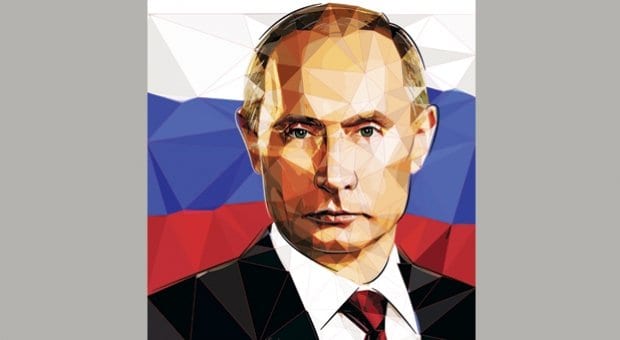

 Why you can trust Xtra
Why you can trust Xtra


